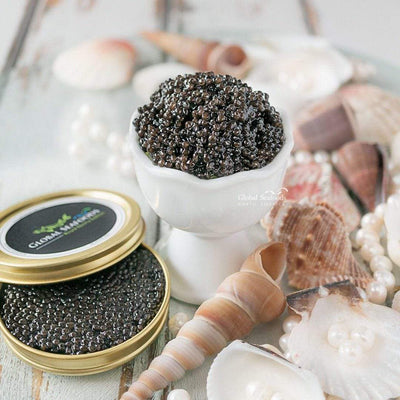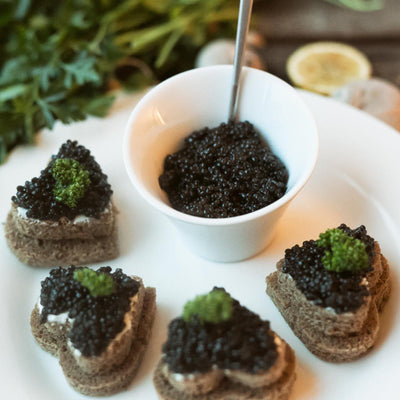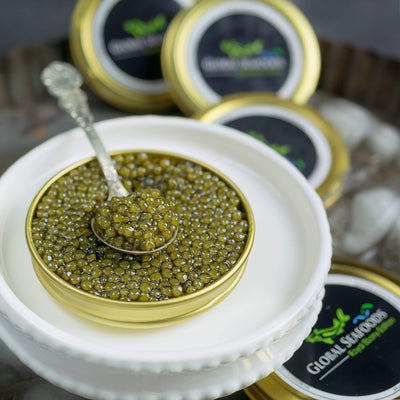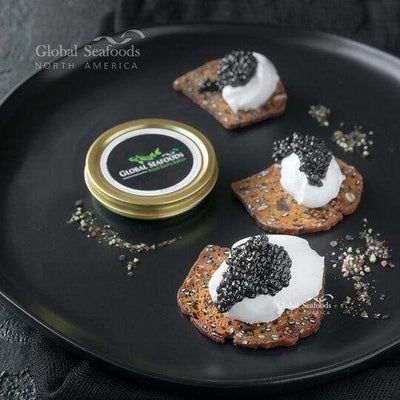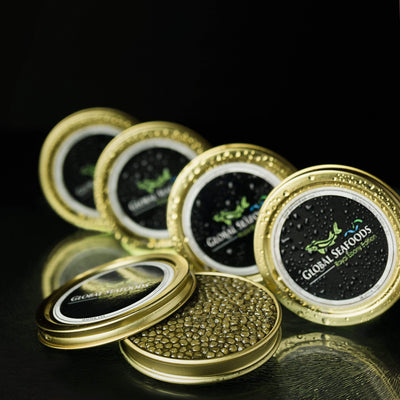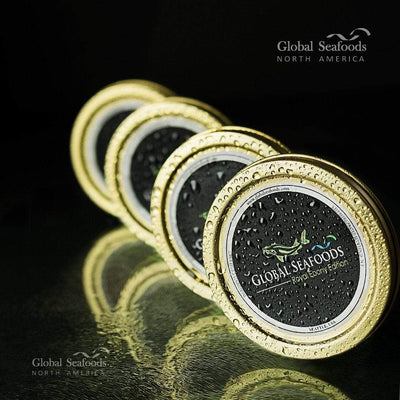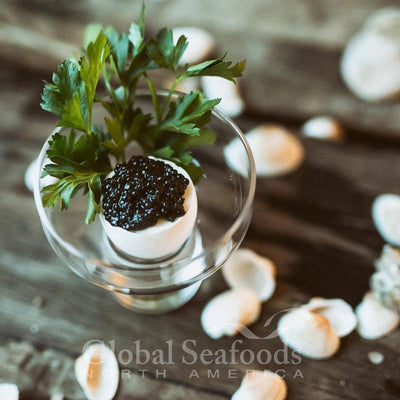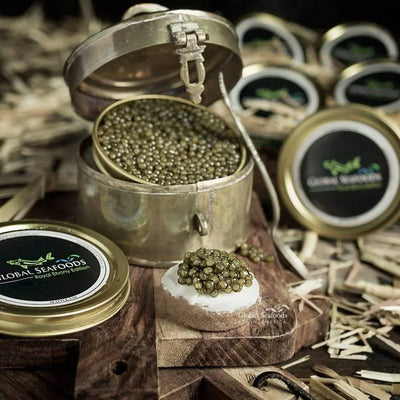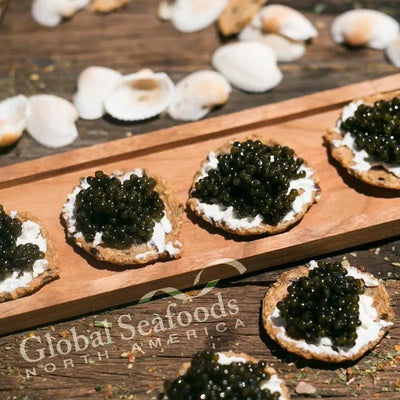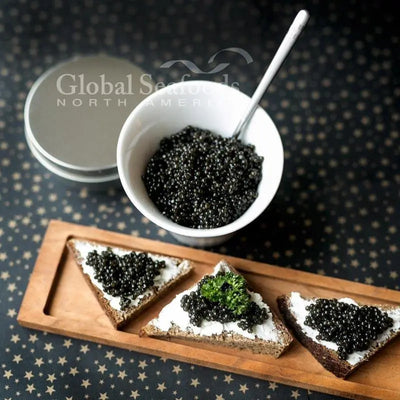Hackleback Caviar: Taste, Benefits, and Serving Tips

Hackleback Caviar: Taste, Benefits, and Ultimate Guide
Hackleback caviar, a luxurious yet affordable delicacy, is a favorite among food enthusiasts. Known for its nutty flavor, firm texture, and sustainability, this caviar variety offers a gourmet experience without the premium price tag of Beluga or Osetra caviar. Beyond its exquisite taste, hackleback caviar is packed with essential nutrients, making it a treat for both your palate and your health.
In this comprehensive guide, you’ll learn everything about hackleback caviar, including its origins, taste profile, health benefits, serving ideas, and sustainability practices.
Shop premium-quality caviar at Global Seafoods. For expert tips and recipe ideas, subscribe to our YouTube channel.
What Is Hackleback Caviar?
Hackleback caviar comes from the shovelnose sturgeon (Scaphirhynchus platorynchus), a species native to the Mississippi River basin in the United States. Known for its accessibility and sustainability, it is often referred to as "American caviar."
Key Features
- Taste: Nutty, buttery, and mildly sweet.
- Texture: Firm eggs with a satisfying pop.
- Sustainability: Farmed and harvested locally, reducing pressure on wild sturgeon populations.
Pro Tip: Hackleback caviar offers a more affordable alternative to premium varieties like Beluga and Osetra, making it an excellent choice for both beginners and connoisseurs.
Taste and Texture: Why Hackleback Stands Out
Flavor Profile
Hackleback caviar boasts a nutty, buttery flavor with hints of sweetness. Its subtle taste pairs beautifully with a variety of accompaniments, allowing its refined flavors to shine.
Texture Comparison
- Firm and Smooth: The slightly firmer eggs create a delightful texture.
- Smaller Grains: These delicate pearls make hackleback caviar visually appealing and easy to incorporate into dishes.
“The nutty flavor of hackleback caviar is a standout characteristic, making it one of the most versatile caviars for culinary use.” – Gourmet Food Enthusiast Magazine
Health Benefits of Hackleback Caviar
Hackleback caviar isn’t just a treat—it’s packed with nutrients that support overall well-being.
Nutritional Highlights
- Omega-3 Fatty Acids: Support heart health, reduce inflammation, and improve brain function.
- Vitamin B12: Essential for energy production and nerve health.
- Vitamin A: Promotes healthy skin, vision, and immune function.
- Vitamin D: Strengthens bones and aids in calcium absorption.
- Iron: Boosts oxygen transport in the body.
Did You Know? A single serving of hackleback caviar provides more than 100% of your daily recommended intake of Vitamin B12.
How to Serve Hackleback Caviar
The delicate flavor and texture of hackleback caviar make it a versatile ingredient for elegant appetizers and main courses.
1. Traditional Serving Ideas
- Chilled and Pure: Serve straight from the container on crushed ice.
- With Blinis: Pair with mini pancakes and crème fraîche for a classic presentation.
- On Crackers: Mild-flavored crackers enhance the caviar’s nutty taste.
2. Modern Pairings
- Caviar Deviled Eggs: Add a touch of luxury to deviled eggs with a dollop of caviar.
- Caviar Pasta: Toss pasta with a light cream sauce and finish with a generous topping of hackleback caviar.
- Caviar Sushi Rolls: Use caviar as a garnish for sushi for a gourmet touch.
3. Beverage Pairings
- Champagne: The crisp bubbles balance the richness of caviar.
- Vodka: A classic pairing that enhances the caviar’s briny undertones.
- Dry White Wine: Options like Chardonnay and Sauvignon Blanc complement the nutty flavor.
How to Store Hackleback Caviar
Proper storage is essential to maintain the freshness and flavor of caviar.
Storage Tips
- Refrigeration: Keep caviar at 28°F to 32°F (-2°C to 0°C) in the coldest part of the fridge.
- Airtight Containers: Use the original vacuum-sealed packaging or transfer to a glass container with a tight lid.
- Avoid Freezing: Freezing can damage the eggs and alter the flavor.
Shelf Life
- Unopened: Lasts up to 6 weeks in the fridge.
- Opened: Consume within 2–3 days for the best quality.
Sustainability of Hackleback Caviar
Eco-Friendly Farming Practices
Hackleback sturgeon are sustainably farmed in the U.S., helping to preserve wild populations. This environmentally friendly approach ensures the species thrives while meeting the growing demand for caviar.
Minimized Environmental Impact
Sustainable farming reduces habitat destruction and supports biodiversity, making hackleback caviar a guilt-free indulgence.
“Sustainability is not just a trend—it’s a responsibility. Hackleback caviar exemplifies how luxury can coexist with eco-conscious practices.” – Sustainable Seafood Alliance
Hackleback Caviar vs. Other Caviar
Key Differences
| Feature | Hackleback Caviar | Beluga Caviar | Osetra Caviar |
|---|---|---|---|
| Flavor | Nutty, buttery, slightly sweet | Creamy, rich, mild | Nutty, robust |
| Texture | Firm, smooth | Large, delicate grains | Medium, silky |
| Price | Affordable | Expensive | Mid-range |
| Sustainability | High | Limited | Moderate |
Where to Buy Hackleback Caviar
For premium-quality hackleback caviar, trust reputable suppliers like Global Seafoods.
Popular Choices
Conclusion: Why Hackleback Caviar Deserves a Spot on Your Table
Hackleback caviar offers a perfect balance of luxury, flavor, and affordability. Its nutty taste, firm texture, and sustainability make it an ideal choice for both everyday indulgence and special occasions. Whether served traditionally or incorporated into creative recipes, hackleback caviar guarantees an unforgettable culinary experience.
Explore premium caviar options at Global Seafoods. For serving tips and inspiration, check out our YouTube channel.
Also in News

How to Make Sea Bream Sushi With Dry-Aged Tuna & Crab Roll — Step-by-Step With Chef Joshua
A complete guide to making Sea Bream sushi at home, including filleting, curing, slicing, and building a Dry-Aged Tuna & Crab sushi roll. Chef Joshua shares professional tips for restaurant-quality results.

Cooked Crab for Game Night: Everything You Need for a Perfect Seafood Party
Take your game night to the next level with a Cooked crab party. Learn the best recipes, cooking tips, and hosting hacks for a memorable seafood feast.

Steam Crab for Date Night: A Romantic Guide to the Perfect Seafood Feast
Make your next date night unforgettable with a romantic Steam crab experience. This guide covers everything you need to know, from ambiance to the best crab varieties.

